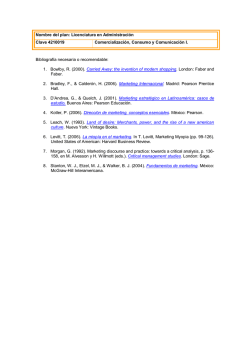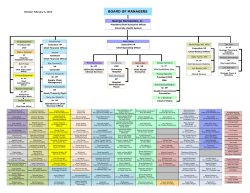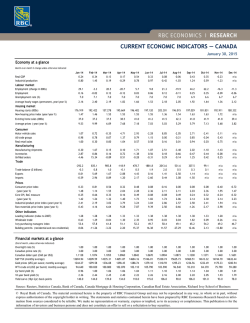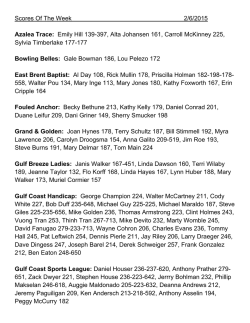
Management 8e. - Robbins and Coulter
Chapter 1 Introduction to Management and Organizations with Duane Weaver Chapter 1, Stephen P. Robbins, Mary Coulter, and Nancy Langton, Management, Eighth Canadian Edition. Copyright © 2005 Pearson Education Canada Inc. 1 OUTLINE • • • • • • Who are managers? What is management? What do managers do? What are the challenges of managing? Why study management? Submitting class exercises Chapter 1, Stephen P. Robbins, Mary Coulter, and Nancy Langton, Management, Eighth Canadian Edition. Copyright © 2005 Pearson Education Canada Inc. 2 Who Are Managers? • Manager – Someone who works with and through other people by coordinating their work activities in order to accomplish organizational goals (Robbins, et. Al, 2006, p. 7) Chapter 1, Stephen P. Robbins, Mary Coulter, and Nancy Langton, Management, Eighth Canadian Edition. Copyright © 2005 Pearson Education Canada Inc. 3 Types of Managers Exhibit 1.2 Managerial Levels Top M anagers M iddle M anagers First-Line M anagers Nonm anagerial Em ployees Chapter 1, Stephen P. Robbins, Mary Coulter, and Nancy Langton, Management, Eighth Canadian Edition. Copyright © 2005 Pearson Education Canada Inc. 4 What Is Management? • Managerial Concerns – Efficiency • “Doing things right” – Getting the most output for the least input – Effectiveness • “Doing the right things” – Work activities that attain organizational goals Chapter 1, Stephen P. Robbins, Mary Coulter, and Nancy Langton, Management, Eighth Canadian Edition. Copyright © 2005 Pearson Education Canada Inc. 5 What Do Managers Do? Three Approaches to describe: • Management Functions • Management Roles (Mintzberg) • Management Skills Chapter 1, Stephen P. Robbins, Mary Coulter, and Nancy Langton, Management, Eighth Canadian Edition. Copyright © 2005 Pearson Education Canada Inc. 6 Exhibit 1.4 Management Functions Planning Organizing Leading Controlling Lead to Defining goals, establishing strategy, and developing sub-plans to coordinate activities Determining what needs to be done, how it will be done, and who is to do it Directing and motivating all involved parties and resolving conflicts Chapter 1, Stephen P. Robbins, Mary Coulter, and Nancy Langton, Management, Eighth Canadian Edition. Copyright © 2005 Pearson Education Canada Inc. Monitoring activities to ensure that they are accomplished as planned Achieving the organization’s stated purpose 7 What Do Managers Do? (cont’d) • Mintzberg’s Management Roles Approach (Robbins, et. al., 2006, Exhibit 1.5, p. 12) – Interpersonal roles • Figurehead, leader, liaison – Informational roles • Monitor, disseminator, spokesperson – Decisional roles • Entrepreneur, disturbance handler, resource allocator, negotiator Chapter 1, Stephen P. Robbins, Mary Coulter, and Nancy Langton, Management, Eighth Canadian Edition. Copyright © 2005 Pearson Education Canada Inc. 8 Exhibit 1.6 Skills Needed at Different Management Levels Top M anagers Conceptual Skills M iddle M anagers Hum an Skills Technical Skills Low er-le vel M anagers Im portance Chapter 1, Stephen P. Robbins, Mary Coulter, and Nancy Langton, Management, Eighth Canadian Edition. Copyright © 2005 Pearson Education Canada Inc. 9 Exhibit 1.8 The Changing Organization Traditional New Organization • • • • • • • • • • • • • • • • • Stable Inflexible Job-focused Work is defined by job positions Individual-oriented Permanent jobs Command-oriented Managers always make decisions Rule-oriented Relatively homogeneous workforce Workdays defined as 9 to 5 Hierarchical relationships Work at organizational facility during specific hours • • • • • • • • • Dynamic Flexible Skills-focused Work is defined in terms of tasks to be done Team-oriented Temporary jobs Involvement-oriented Employees participate in decision making Customer-oriented Diverse workforce Workdays have no time boundaries Lateral and networked relationships Work anywhere, anytime Chapter 1, Stephen P. Robbins, Mary Coulter, and Nancy Langton, Management, Eighth Canadian Edition. Copyright © 2005 Pearson Education Canada Inc. 10 Exhibit 1.9 Challenges Impacting the Manager’s Job Ethics Knowledge Management Diversity Manager Globalization Innovation Customers Chapter 1, Stephen P. Robbins, Mary Coulter, and Nancy Langton, Management, Eighth Canadian Edition. Copyright © 2005 Pearson Education Canada Inc. E-Business 11 Challenges to Managing • Ethics – Increased emphasis on ethics education in university and college curriculums – Increased creation and use of codes of ethics by businesses • Workforce Diversity – Increasing heterogeneity in the workforce • More gender, minority, ethnic, and other forms of diversity in employees (cultural values important) • Biggest immediate issue? (aging pop.) Chapter 1, Stephen P. Robbins, Mary Coulter, and Nancy Langton, Management, Eighth Canadian Edition. Copyright © 2005 Pearson Education Canada Inc. 12 Challenges to Managing (cont’d) • Globalization – Management in international organizations – Political and cultural challenges of operating in a global market Chapter 1, Stephen P. Robbins, Mary Coulter, and Nancy Langton, Management, Eighth Canadian Edition. Copyright © 2005 Pearson Education Canada Inc. 13 Challenges to Managing (cont’d) • E-business (electronic business) – The work performed by an organization using electronic linkages to its key constituencies – E-commerce: the sales and marketing component of an e-business Chapter 1, Stephen P. Robbins, Mary Coulter, and Nancy Langton, Management, Eighth Canadian Edition. Copyright © 2005 Pearson Education Canada Inc. 14 Challenges to Managing (cont’d) • Importance of Customers – Customers have more opportunities than ever before – Delivering consistent high-quality service is essential – Managers need to create customer-responsive organizations Chapter 1, Stephen P. Robbins, Mary Coulter, and Nancy Langton, Management, Eighth Canadian Edition. Copyright © 2005 Pearson Education Canada Inc. 15 Challenges to Managing (cont’d) • Innovation – Doing things differently, exploring new territory, and taking risks – Managers need to encourage all employees to be innovative Chapter 1, Stephen P. Robbins, Mary Coulter, and Nancy Langton, Management, Eighth Canadian Edition. Copyright © 2005 Pearson Education Canada Inc. 16 Challenges to Managing (cont’d) • Knowledge Management – The cultivation of a learning culture where organizational members systematically gather and share knowledge with others in order to achieve better performance • Learning Organization – An organization that has developed the capacity to continuously learn, adapt, and change Chapter 1, Stephen P. Robbins, Mary Coulter, and Nancy Langton, Management, Eighth Canadian Edition. Copyright © 2005 Pearson Education Canada Inc. 17 Exhibit 1.11 Learning Organization Vs. Traditional Organization Chapter 1, Stephen P. Robbins, Mary Coulter, and Nancy Langton, Management, Eighth Canadian Edition. Copyright © 2005 Pearson Education Canada Inc. 18 Why Study Management? • The Value of Studying Management – The universality of management • Good management is needed in all organizations – The reality of work • Employees either manage or are managed – Entrepreneurship • The organized effort to pursue opportunities to create value and grow through innovation and uniqueness Chapter 1, Stephen P. Robbins, Mary Coulter, and Nancy Langton, Management, Eighth Canadian Edition. Copyright © 2005 Pearson Education Canada Inc. 19 Submitting Class Exercises • Proper Format: – – – – – Font Arial 12 pt. Double-spaced Provide a proper cover page Provide the answers Provide a reference list (Harvard Format) • Don’t just answer the question from your head, conduct research to prove your point. Support your ideas with inline citations and references. Chapter 1, Stephen P. Robbins, Mary Coulter, and Nancy Langton, Management, Eighth Canadian Edition. Copyright © 2005 Pearson Education Canada Inc. 20 Thank You • Come prepared next class (see outline for next two chapters and exercise questions to prepare) Chapter 1, Stephen P. Robbins, Mary Coulter, and Nancy Langton, Management, Eighth Canadian Edition. Copyright © 2005 Pearson Education Canada Inc. 21
© Copyright 2026





